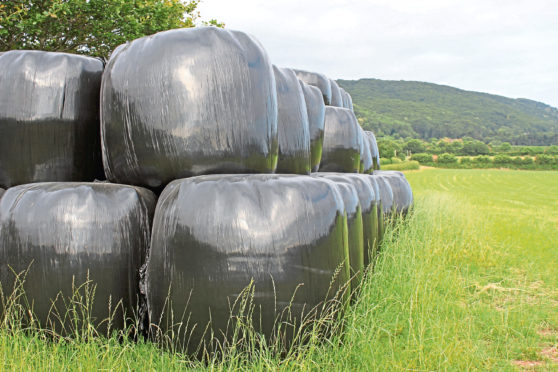A group of Scottish farmers has joined forces to find new ways of disposing of, and reducing the production of, waste plastic.
The eight north-east producers, who have formed the Thainstone Silage Wrap and Plastics Group, will also look at the use of non-plastic alternatives for use in products such as bale wrap.
The group is supported by the Soil Association Scotland-led Rural Innovation Support Service and its work is facilitated by farm consultant Ewan Johnston from SAC Consulting.
“The catalyst for the project was the non-renewal of derogations to use on-farm drum incinerators, following the EU Industrial Emissions’ directive,” said Mr Johnston.
“Following the incineration ban, effective from January 1 2019, a big challenge was created for farmers regarding the disposal of single-use plastics such as silage bale wrap, fertiliser bags, feed bags and buckets, and agrochemical containers.”
He said these products were typically made from polyethylene (PE) because it is cheap, easily processed, durable and flexible.
“However, due to their non-biodegradable nature, disposal is a big environmental concern,” added Mr Johnston.
Following the incineration ban, the group looked at a range of solutions – including asking the local authority to create agricultural waste collection depots and manufacturing suitable plastics from biopolymers. However, no easy fix was found.
“Until biodegradable replacements start to become more widely available, recycling is one of the only solutions farmers have but it isn’t always easy,” said Mr Johnston.
One of the farmers involved in the project – George Davidson from Inschfield Farm, near Insch – has invested in equipment to help reduce costs when recycling silage bale wrap and chemical containers.
He said: “We have invested jointly, with our neighbour, in a waste baler to help bale the waste plastic which, in the long term, will hopefully reduce the cost of haulage for disposal.
“This year we have also trialled the clear silage wrap, which offers more recycling opportunities and reduced disposal costs.”
Mr Johnston is now calling on agricultural companies offering ways to reduce plastic use – either through machinery for recycling or innovative new products – to get in touch as the farmers involved in the project are keen to trial different technology.
He said: “This group is established, it has gained significant insight into farm plastic trials, including recycling, and all participants would be interested in trialling any product or system that is up for the challenge.”
